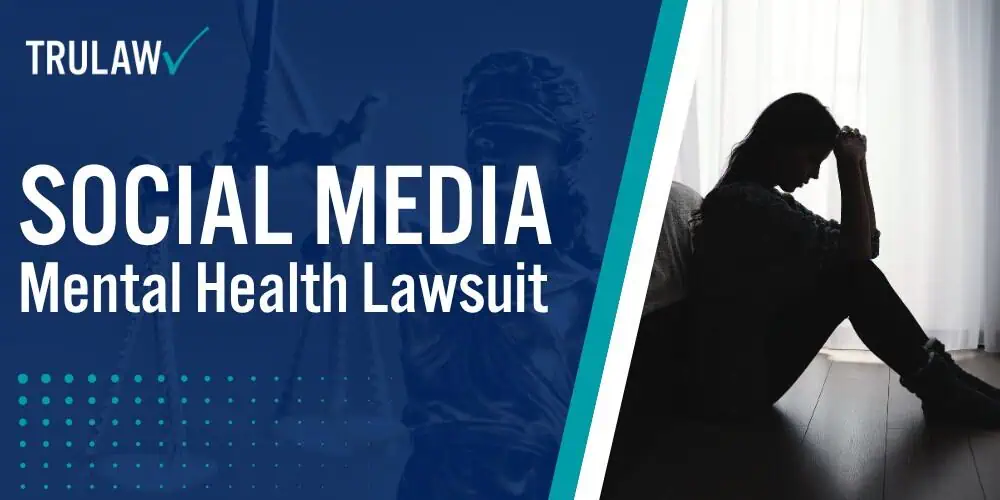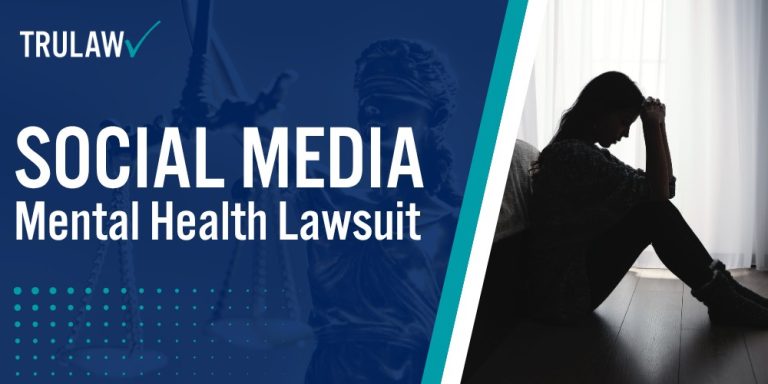Specific mental health conditions and psychological injuries form the basis for qualifying claims in social media addiction litigation.
With up to 95% of youth ages 13-17 reporting social media platform use, and more than a third saying they use these platforms “almost constantly,” the connection between platform design and mental health disorders has become well-documented.
Scientific evidence links addictive platform features to psychological and behavioral disorders affecting young users exposed to engagement-driven algorithms.
Depression, Anxiety, and Mood Disorders
Clinical depression and anxiety disorders represent the most frequently reported mental health conditions in social media harm lawsuits.
Plaintiffs document how constant social comparison, fear of missing out, and validation-seeking behaviors triggered by platform features led to diagnosable mood disorders requiring professional treatment.
According to the CDC, 40% of high school students reported persistent feelings of sadness or hopelessness during the past year, with 20.4% seriously considering suicide and 16% making a suicide plan.
Documented mental health conditions in these lawsuits encompass:
- Clinical depression: Persistent sadness, loss of interest in activities, and feelings of worthlessness linked to social comparison and curated content exposure on Instagram and Facebook
- Anxiety disorders: Heightened nervousness, panic responses, and constant worry triggered by notification systems, engagement metrics, and fear of social exclusion from platform interactions
- ADD/ADHD symptoms: Attention difficulties and hyperactivity worsened by rapid content switching and algorithm-driven content that conditions users to expect constant stimulation
- Attention fragmentation: Inability to focus on tasks or maintain concentration, commonly called “TikTok Brain,” caused by platform conditioning for brief, high-stimulation content consumption
Young users who spent years exposed to dopamine-triggering platform features show measurable changes in attention span, emotional regulation, and mood stability.
Mental health professionals increasingly recognize the role of social media exposure in triggering and worsening these conditions, particularly when usage begins during adolescence.
Families whose children suffered mental health deterioration linked to addictive social media platform features may qualify for compensation through coordinated legal action against Meta, TikTok, Snapchat, and YouTube.
Contact TruLaw using the chat on this page to receive an instant case evaluation and determine whether you qualify to file a Social Media Addiction Lawsuit today.
Body Image and Eating Disorders
Social media platforms’ emphasis on visual content and filtered imagery has contributed to a documented rise in body image issues among adolescent users.
Research shows 46% of adolescents aged 13-17 said social media makes them feel worse about their body image, with higher rates among teenage girls exposed to appearance-focused content.
The following body image and eating disorders have been recognized in litigation:
- Body dysmorphia: Distorted self-perception and obsessive focus on perceived physical flaws triggered by filtered images and beauty standards promoted through platform algorithms
- Anorexia nervosa: Severe food restriction and dangerous weight loss linked to harmful diet content and pro-anorexia communities that platforms failed to adequately moderate
- Bulimia nervosa: Binge eating followed by purging behaviors connected to platform promotion of extreme diet and fitness content through recommendation algorithms
- Algorithm amplification: Platform features that recognize user interest in appearance-focused content and systematically deliver more extreme material about dieting and weight loss
Platforms’ algorithms identify when users engage with appearance-related content and respond by serving increasingly extreme material.
Young users who clicked on fitness content found themselves inundated with dangerous diet advice and materials glorifying eating disorders—all delivered through recommendation systems designed to keep them engaged rather than protect their wellbeing.
If your child developed an eating disorder or body image condition after heavy social media use, you may have grounds for legal action.
TruLaw connects families with litigation attorneys experienced in social media harm cases.
Self-Harm and Suicidal Behaviors
Severe mental health issues documented in social media addiction lawsuits involve self-harm behaviors and suicidal ideation directly linked to platform use.
Suicide remains the third leading cause of death among 15-29 year olds, and CDC data shows 9.5% of high school students reported attempting suicide in the past year.
Plaintiffs present evidence of these severe behavioral outcomes:
- Self-injury patterns: Cutting, burning, or other forms of deliberate self-harm that adolescents report beginning or intensifying during periods of heavy social media use and exposure to related content
- Suicidal ideation: Persistent thoughts about suicide, planning suicide attempts, or expressing suicidal intent through platform features or in response to cyberbullying experienced on platforms
- Suicide attempts: Actual attempts to end one’s life that families can document as occurring shortly after specific platform interactions, cyberbullying incidents, or exposure to harmful content
- Dangerous viral challenges: Participation in platform-promoted challenges encouraging harmful behaviors, from mild self-injury to life-threatening actions amplified through algorithmic recommendation systems
Internal documents reveal platforms were aware their features contributed to these tragic results yet prioritized engagement metrics over user safety.
The correlation between heavy social media use and increased suicidal behaviors has become too substantial to dismiss, with families able to document their children’s mental health decline through saved messages, content history, and medical records.
Families dealing with these devastating impacts need experienced legal representation to pursue justice.
If your child experienced self-harm, suicidal thoughts, body image disorders, or severe anxiety connected to Instagram, TikTok, or other social media platforms, you may have grounds to pursue legal action and financial recovery.
Contact TruLaw using the chat on this page to receive an instant case evaluation and determine whether you qualify to join others in filing a Social Media Lawsuit today.



